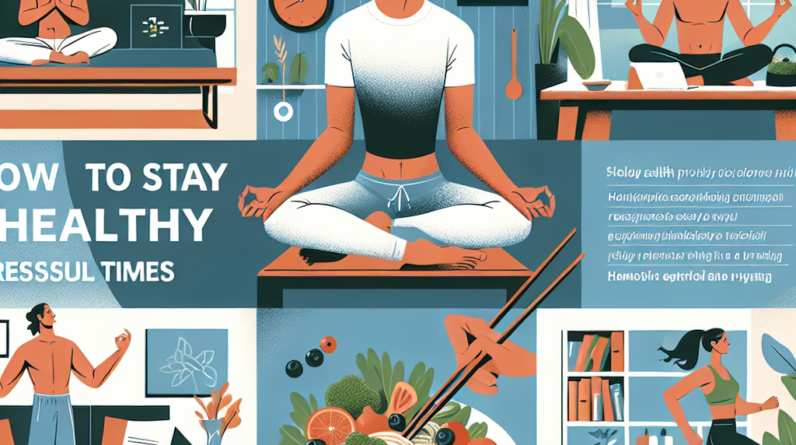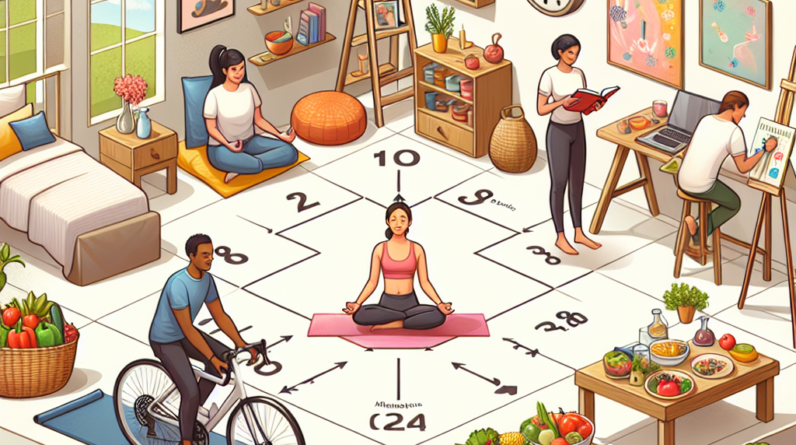
1. Nourish Your Body with the Right Foods
Choose Whole Foods Over Processed Foods
One of the first steps I took when trying to cope with stress was to really look at what I was putting into my body. Whole foods, like fresh fruits, veggies, nuts, and whole grains, have far more nutrients than any pre-packaged snack. My mood improve when I included more of these foods in my diet. The concept here is simple: the better the fuel, the better the performance.
Get a Huge Discount and Bonus! Try for 90 Days Risk Free
Honestly, I used to let stress dictate my eating habits, often reaching for chips or sugary treats that made me feel great in the moment but awful later. By switching to whole foods, I found I had more consistent energy levels and less of that dreaded crash that comes with sugar highs.
It’s fascinating to realize how food connects with our emotions. Taking time to prepare meals with whole ingredients also became a mindful activity for me – a small but effective way to center myself amidst chaos. Plus, cooking can be a great creative outlet!
Stay Hydrated
I can’t stress enough how crucial hydration is for mental and physical well-being, especially during stressful times. When I’m overwhelmed, I often forget to drink water. It’s easy to fall into that trap, thinking I’ll get to it later. But, staying hydrated aids in cognitive function and helps combat fatigue.
In my experience, keeping a water bottle handy has worked wonders. I didn’t just fill it up at the start of the day; I made it a goal to finish it before lunchtime and start on a second one afterward. Little challenges can make drinking enough water more fun!
Let’s not forget about electrolytes! When I’m under stress, I enjoy infusing my water with lemon or a pinch of sea salt. It adds some flavor and can help replenish what’s lost when we sweat or feel anxious.
Limit Caffeine and Sugar
Trust me, I loved my morning coffee just as much as the next person. But I’ve learned the hard way that too much caffeine can heighten anxiety and disturb sleep patterns. Swapping out an afternoon cup for herbal tea or simply practicing moderation has made a huge difference in my stress levels.
Similarly, sugar can be detrimental. Initially, the sugar rush may seem great, but once that wave fades away, you’re often left feeling jittery and even more anxious. I’ve started keeping dark chocolate on hand for a treat rather than candy bars that rapidly spike my glucose levels.
Finding balance is key here. Making simple swaps like these means keeping my energy steady and my mood much more even throughout the day. Adapting these habits has been a game changer for me!
Get a Huge Discount and Bonus! Try for 90 Days Risk Free
2. Move Your Body Regularly
Find an Activity You Enjoy
When I first began introducing regular exercise into my routine for stress relief, I didn’t know where to start. The key? Find something that I actually liked! Whether it’s a brisk walk, cycling, or dancing in my living room, make it fun!
Community classes or online workouts can provide a social aspect which can be really beneficial. I often find it motivating to join a virtual dance class or a home workout challenge. Getting to move with others, even online, helps ease stress while keeping me active.
Striving for consistency is essential; I made it a goal to move in some way every day, even if it’s just a quick five-minute stretch. Over time, these moments add up and I began to notice a positive shift not just in my health, but also in my mood.
Make Time for Rest and Recovery
I sometimes get caught up in the hustle culture, which can be exhausting! I’ve learned that taking the time to rest is equally important as working out. Every week, I schedule days that are dedicated to nothing but self-care – reading, taking long baths, or simply staring at the ceiling! Sounds silly, but rest is restorative.
Need a Serious Energy BOOST? Huge Discount Try for 90 Days Risk Free
Moreover, naps can be incredibly revitalizing. I remember a time when I was so overwhelmed by work that I skipped them. Once I embraced short afternoon naps, I was amazed at how refreshed I felt afterward. It’s all about building that balance!
Sleep hygiene is also part of this. I made a cozy night routine that includes winding down an hour before bed. It’s little changes like putting down the screen and lighting a candle that have transformed my sleep quality!
Get Outside
Connecting with nature has significant benefits for mental health, and for me, it’s a great way to alleviate stress. Whenever I feel overwhelmed, I take a walk in nearby parks or just step out into my backyard. Fresh air does wonders!
I try to soak up that sunshine whenever I can. Vitamin D is crucial, and the gentle breeze can really lift my spirits. Plus, being around greenery is scientifically proven to reduce stress, so why not utilize this natural remedy?
I even started a small gardening project this year. Trust me, digging in the dirt has been therapeutic in ways I never expected. Watching things grow, even a tiny basil plant, gives me hope and joy that helps counteract stressful moments.
3. Practice Mindfulness and Relaxation Techniques
Integrate Meditation into Your Routine
I was once sceptical about meditation—thought it was just sitting in silence, which I found boring. However, dedicating just a few minutes daily has been a game changer! I found guided apps that helped me ease into it.
The best part is I can do it anywhere! There’s something calming about taking a few moments to simply focus on my breath, even amidst a hectic day. It grounds me and allows space for clarity and calm.
Over time, I’ve noticed my brain gets better at being present. Being mindful helps me respond more effectively during stressful situations instead of just reacting. It’s kind of magical, honestly!
Explore Yoga or Tai Chi
Yoga was another area I was reluctant to jump into until a friend dragged me along to a class. Honestly, initially, I felt awkward, but soon found it incredibly soothing. The combination of movement and breathwork has a remarkable ability to alleviate tension.
Even at home, Yoga with YouTube channels can be a quick go-to. I’ve learned that I don’t have to be a pro; just moving and stretching my body a bit a day goes a long way. Plus, Tai Chi has been fantastic! It feels like a dance, and it also helps build mindfulness.
Incorporating these practices regularly has given me better stress management skills. There’s a sense of community in group classes as well! I enjoy those shared post-yoga chai chats more than I ever expected.
Explore Deep Breathing Techniques
Whenever I feel stress creeping in, deep breathing is my go-to strategy. It’s so simple yet so effective! Finding a quiet space to focus on my breath has helped to bring swift calm.
I learned a cool technique called the 4-7-8 method: inhaling for 4 seconds, holding for 7, then exhaling slowly for 8 seconds. It sounds easy, but it’s incredibly potent. Practicing this a few times almost instantly soothes those anxious thoughts.
It’s also a habit I can practice anywhere—at my desk, during a call, or even in the line at the grocery store. It’s about finding those moments to take a breath, literally and figuratively.
4. Foster Healthy Relationships
Connect with Friends and Family
I’ve learned that stress can sometimes blind me to the importance of my relationships. Taking the time to connect with friends and family can truly work wonders. Schedule regular catch-ups, even if it’s just a quick call or text. Sometimes, just venting can help clear your head.
Another thing that worked for me was organizing small get-togethers or even virtual hangouts. Moving from screen time to quality time is crucial and uplifting! I really cherish those shared laughs that lighten my mood.
Don’t shy away from sharing your feelings, either! Vulnerability can lead to deeper connections. You’ll be surprised how many people relate to your experiences and can offer support!
Set Boundaries
Learning to say ‘no’ felt daunting to me, but it’s been freeing! Being surrounded by demands can overwhelm anyone. I learned it’s okay to prioritize my well-being and not take on everything that comes my way.
When I began setting boundaries, I felt more in control. It’s helped me not just in my personal life but also with work responsibilities. It might feel uncomfortable at first, but it becomes easier with practice!
Remember, it’s alright to take time for yourself without the guilt. Those boundaries protect your mental space and let you recharge, which ultimately makes you more present for those you care about.
Seek Professional Help When Needed
It took me a while to recognize when I needed additional support. Therapy can have a negative stigma attached, but I learned that talking with a professional provides incredible insights and coping strategies. There’s no shame in seeking help!
I found that having someone external to help might shine a light on solutions I wouldn’t see on my own. Even just a few sessions can provide a fresh perspective – it’s like hitting the refresh button on life’s challenges.
Support groups can also be a great avenue if you feel comfortable with that. Hearing others’ stories not only helps one feel less alone but can lead to discovering new strategies and coping mechanisms!
5. Prioritize Sleep
Establish a Sleep Routine
Prioritizing sleep during stressful times is essential. Setting a consistent bedtime and waking time helped me regulate my body’s internal clock. Honestly, when I started going to bed and getting up at more similar times, I felt way more energized!
I also cut out screens an hour before bedtime to allow my brain to unwind. Instead, I read a book or journaled, which has become a comforting ritual. Those calming activities encourage a smoother transition into sleep.
Incorporating calming scents in my bedtime routine, like lavender or chamomile, has also improved my sleep quality. It’s become a special time I look forward to every day – a little luxury to my routine!
Create a Comfortable Sleep Environment
When I realized how important my sleep environment was, I made a few small tweaks. Investing in blackout curtains and a good quality mattress changed the game for me. Plus, maintaining a cool temperature helps get better rest at night.
Decluttering my bedroom was also a big help. A calm, organized space is conducive to a peaceful mind. Surrounding myself with comforting items like soft blankets or favorite books creates the perfect atmosphere for winding down.
Before bed, I often take a moment to practice gratitude, letting go of the day’s stressors, which sets a positive tone for restful sleep!
Listen to Your Body’s Signals
Sometimes, it’s easy to ignore our bodies when they’re telling us they need rest. Over time, I’ve learned that listening to my body is crucial for stress management. If I feel lethargic or anxious, that’s my cue to slow down.
Taking a mental health day or a moment to breathe rather than push through work can be empowering. Understanding my limits and listening closely has allowed me to find a sustainable rhythm that helps alleviate stress.
Recognizing when I need a break has become a vital skill. It’s shown me the importance of nurturing myself, which enables me to be my best self when serving others.
Frequently Asked Questions
1. How does nutrition affect my stress levels?
Nutrition plays a significant role in how we feel. Eating a balanced diet with whole foods helps maintain stable mood levels and provides essential nutrients that can alleviate stress.
2. What are some simple exercises I can do for stress relief?
Simple things like taking a brisk walk, practicing yoga, or even dancing around your living room can effectively help release tension and boost your mood.
3. How can I improve my sleep quality?
Establishing a routine, creating a comfortable sleep environment, and winding down before bedtime can significantly improve your sleep quality and aid in stress management.
4. When should I consider seeking professional help?
If stress starts to interfere significantly with your daily life, work, or relationships, it may be time to seek professional support. There’s no shame in reaching out for help!
5. How can mindfulness help reduce stress?
Practicing mindfulness through activities like meditation or deep breathing allows you to stay present, reduce anxiety, and enhance your ability to manage stress in a healthier way.








